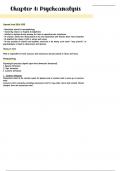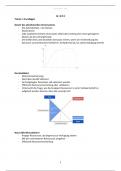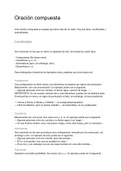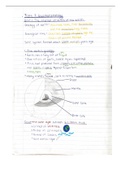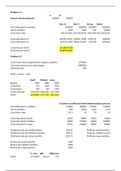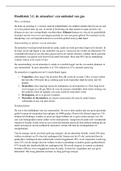Chapter 4: Psychoanalysis
Sigmund Freud (1856-1939)
- Neurologist trained in neuropathology
- Trained by Charcot at Hospital de Salpêtrière
- Worked on hysteria during training, but later he opened private consultation
- He created a whole new theory based on his own observation and theories about menta disorders
- He amplified his theory ́s field to society and culture
- He was excluded of scientific and academic world due to his theory, as he wasn’t “very scientific”, as
psychoanalysis is based in observations and opinions
Theory of mind
Mind is responsible for both conscious and unconscious decisions based on drives and forces
Metapsychology
Psychological processes depend upon three dimensions (metaverse):
1. Dynamic dimension
2. Topic dimension
3. Economic dimension
1. Dynamic dimension:
Unconscious mind, in the constant search for pleasure and in constant need to arise up to conscious
mind
Conscious mind, constantly controlling unconscious mind to stay under control and contains filtered
thoughts from the unconscious mind
, 2. Topic dimension:
Psyche is developed similarly to the nervous system, so different structures have different functions
3 levels:
I. Consciousness:
• The most superficial structure
• Mental state accessible through introspection
• Function: to perceive internal and external sensations
• Offers identity and knowledge of real world
II. Non-consciousness:
—> Pre-consciousness:
• Intermediate stage that allows access from unconscious to conscious if we take the enough effort
to retrieve them
• It ́s not a fight field
—> Unconsciousness:
• Keeps past experiences, thoughts and wishes from which the person is not conscious about, but
they influence in behaviour and thinking
• Is a force moving the person towards a specific direction. Is magic
• Is not logic nor rational, is ambiguous and ambivalent
• Is non-temporal: past, future and present mix together here
• The content is not abstract but symbolic: very specific facts are stored and manifested in a
symbolic manner
3 psychic structures:
Id —> unconscious
Pleasure-oriented and selfish. Driven by ‘pleasure principle’. Insatiable instincts present from birth
• Unknown psychic part but with a great influence in behaviour and dreams
• Principle of pleasure: immediate satisfaction of needs
• Tension law: Tension is uncomfortable and motivates individuals to engage in activities aimed at
relieving this tension. People are driven to seek pleasure and avoid discomfort
Ego —> conscious
Rational, driven by the ‘reality principle’. Balances conflicting demands of the Id and SuperEgo
• In contact with internal and external reality
• Mediation role: controlling language, behaviour and perceptions.
• Principle of reality: ego will react according to the need of doing or not doing depending on
contextual data and internal needs
Sigmund Freud (1856-1939)
- Neurologist trained in neuropathology
- Trained by Charcot at Hospital de Salpêtrière
- Worked on hysteria during training, but later he opened private consultation
- He created a whole new theory based on his own observation and theories about menta disorders
- He amplified his theory ́s field to society and culture
- He was excluded of scientific and academic world due to his theory, as he wasn’t “very scientific”, as
psychoanalysis is based in observations and opinions
Theory of mind
Mind is responsible for both conscious and unconscious decisions based on drives and forces
Metapsychology
Psychological processes depend upon three dimensions (metaverse):
1. Dynamic dimension
2. Topic dimension
3. Economic dimension
1. Dynamic dimension:
Unconscious mind, in the constant search for pleasure and in constant need to arise up to conscious
mind
Conscious mind, constantly controlling unconscious mind to stay under control and contains filtered
thoughts from the unconscious mind
, 2. Topic dimension:
Psyche is developed similarly to the nervous system, so different structures have different functions
3 levels:
I. Consciousness:
• The most superficial structure
• Mental state accessible through introspection
• Function: to perceive internal and external sensations
• Offers identity and knowledge of real world
II. Non-consciousness:
—> Pre-consciousness:
• Intermediate stage that allows access from unconscious to conscious if we take the enough effort
to retrieve them
• It ́s not a fight field
—> Unconsciousness:
• Keeps past experiences, thoughts and wishes from which the person is not conscious about, but
they influence in behaviour and thinking
• Is a force moving the person towards a specific direction. Is magic
• Is not logic nor rational, is ambiguous and ambivalent
• Is non-temporal: past, future and present mix together here
• The content is not abstract but symbolic: very specific facts are stored and manifested in a
symbolic manner
3 psychic structures:
Id —> unconscious
Pleasure-oriented and selfish. Driven by ‘pleasure principle’. Insatiable instincts present from birth
• Unknown psychic part but with a great influence in behaviour and dreams
• Principle of pleasure: immediate satisfaction of needs
• Tension law: Tension is uncomfortable and motivates individuals to engage in activities aimed at
relieving this tension. People are driven to seek pleasure and avoid discomfort
Ego —> conscious
Rational, driven by the ‘reality principle’. Balances conflicting demands of the Id and SuperEgo
• In contact with internal and external reality
• Mediation role: controlling language, behaviour and perceptions.
• Principle of reality: ego will react according to the need of doing or not doing depending on
contextual data and internal needs

